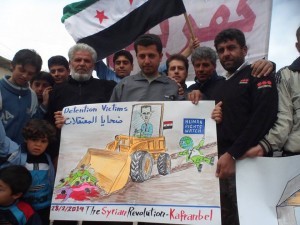Kfar Nabel Media Office Continues Work Despite Assassination Attempt on Director

Hazzaa Adnan al-Hazzaa
(Kfar Nabel, Syria) – Human rights defender and director of the Kfar Nabel media office Raed al-Fares survived an assassination attempt on January 29 when he was shot by two masked men as he returned to his home from the Kfar Nabel Media Office.
Doctors at the Dar al-Hikma hospital in Kfar Nabel were able to stop al-Fares’s bleeding and removed two bullets from his body, saving his life. Four hours later, they announced that he was in stable condition. He still needed medical care and rest, which he received in the Turkish city of Reyhanli.

Al-Fares insists on continuing his media work in service of the revolution and keeping Kfar Nabel’s Media Office open and running.Al-Fares was involved with the revolution since its inception. He made this town of 30,000 people internationally known due to his creative use of English and Arabic-language banners and signs and his photographs of demonstrations in Kfar Nabel.
“Al-Fares is one of the people who put Kfar Nabel, with its banners and satirical art, on the world’s map,” said activist Hanady Zahlout in an article on the website We are All Partners in the Nation. “He spoke to the world with a depth that many of the elites of the Syrian uprising were unable to approximate. The assassination attempt on al-Fares does not just target him personally, but all of Kfar Nabel, as well as a true symbol of the free Syrian revolution that strives for a modern, civil, democratic state,” she added.
Al-Fares was known for his political neutrality. “I only belong to the revolution – the Syrian revolution is an uprising of the people, and I am of the people,” he said.
He believes that the revolution’s goals are freedom, justice, equality, and democracy, which hardline Islamist groups such as Al-Qaeda are trying to undermine since they consider democracy to be un-Islamic.
In the last week of 2013, the Al-Qaeda affiliated Islamic State in Iraq and Syria, also known as ISIS, raided Kfar Nabel’s Media Office and the offices of two of its initiatives: Radio Farsh and Mantara magazine. ISIS confiscated all the equipment and told workers that it wanted their “apostate leader,” Raed al-Fares, who was then not in Kfar Nabel.
The Media Office continued its work without interruption. According to artist Ahmad Jalal, 33, the media office’s second in command, it even produced posters and banners rejecting ISIS at the height of its power in Kfar Nabel. Jalal insisted that the hospitalization of al-Fares did not affect the work of the office.
According to Jalal, Radio Farsh stopped all activities for around a month after ISIS’s raid before resuming after al-Fares replaced the confiscated equipment. He added that the publishing of Mantara magazine is still suspended for lack of an adequate printer.
The media office has five members, including the photographer Hamoud al-Juneid, 34, who describes al-Fares as the founder and the engineer behind Kfar Nabel’s media production. He adds that al-Fares’s physical absence does not mean that his mind and his ideas are not still present.
Juneid specializes in photographing battles in the suburbs of Idlib for the media office. Around a month ago he was wounded while photographing clashes between the regime and the opposition at the government controlled Al-Hamidiya military base eight kilometers west of Kfar Nabel.
“Even though I haven’t fully recovered, I am still doing my job and still going to the front lines. I love my work, despite its danger,” he said.
Juneid, like others, fears ISIS. But he says that doesn’t stop him from working.
“We will continue until Syria is liberated from ISIS and Assad, or we will die trying,” he said.
ISIS withdrew from Kfar Nabel at the beginning of 2014 without a fight as a result of pressure from the Free Syrian Army and the Islamic Front, who announced an armed campaign against ISIS in all of Syria. Fares returned to Kfar Nabel ten days after the withdrawal to continue his work. The assassination attempt came just as he felt he could move around freely.
Al-Fares describes the attempt as terrifying, where he tasted death but did not die, even though his assailants shot more than 20 bullets at him. “My luck is due to God’s grace, as if God himself held back most of those bullets,” he said.
He adds that he has no personal enmity with anyone that would lead to such an attempt. He is convinced that his assailants were affiliated with ISIS, or at the very least individuals who followed a similar.
In the absence of effective security and judicial authorities in Kfar Nabel, no one dares launch an investigation into the assassination attempt.
